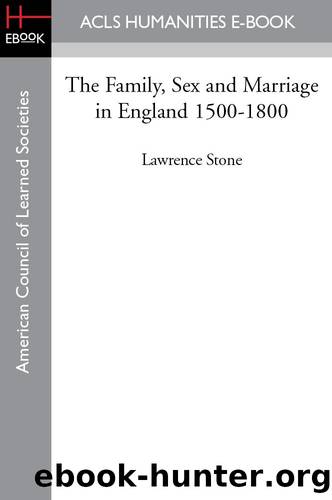The Family, Sex and Marriage in England 1500-1800 by Lawrence Stone

Author:Lawrence Stone [Stone, Lawrence]
Language: eng
Format: epub
ISBN: 9781597409896
Publisher: ACLS Humanities E-Book
Published: 2013-12-14T21:00:00+00:00
Scotland was naturally well behind England in abandoning the traditional behaviour, which could therefore still be recollected in 1813 by Thomas Somerville, who was born in 1741. He remembered the time when ‘austerity… in the treatment of the young was not confined to schools but was the rule also in the family - parents keeping their children, even when grown to mature years, at a great distance and exacting from them a ceremonious attention to the forms of outward respect.’ In 1797 President John Witherspoon of Princeton College, an emigre representing Scottish Enlightenment ideas in the New World, protested that ‘many a free-born subject is kept a slave for the first ten years of his life….’ ‘Let them romp and jump about,’ he urged. ‘I would recommend every expression of affection and kindness to children, when it is safe, that is to say, when their behaviour is such as to deserve it.’21
Modes of address from children to parents also support belief in a major change in personal relationships among the squirarchy and upper [Page 414] bourgeoisie. As we have seen, the early seventeenth-century convention was stiff, formal and deferential, parents being addressed as ‘Sir’ and ‘Madam’. In the 1720S, however, the young John Verney, away at school for the first time, began his letters to his father with ‘Dear Pappy’ or ‘Dear Papa’, and referred to his mother as ‘dear Mamma’. Sir Richard Steele said of his fiveyear-old son, ‘we are very intimate friends and playfellows’, and told his daughters, ‘my soul is wrapped up in your welfare.’ By 1778, at the height of this trend to affectionate parent-child relations, the Countess of Bristol could talk ecstatically about her ‘little fairies… bleating… that dear word “Mamma”’. By that time this new mode was seeping down to the upper bourgeoisie, and in 1774 The Lady’s Magazine published a (probably fictitious) letter from a merchant’s daughter complaining that her friends were shunning her because she would not stop addressing her parents as ‘father’ and ‘mother’, and start calling them by ‘the pretty delicate names of papa and mama’. She expressed her mock fear that ‘father’ and ‘mother’ would soon disappear from the dictionaries as ‘merely obsolete words’.22
Among the landed elite, the current modes of address to parents became more and more extravagantly affectionate at the height of romanticism in the early years of the nineteenth century. In 1814 Lady Caroline Capel addressed her mother, the Countess of Uxbridge, as ‘Dearest, best and kindest of mothers’, and signed herself ‘your most devoted, affectionate, and dutiful….’ Fred Douglas as a schoolboy at Westminster in 1801, and later on the Grand Tour, was clearly devoted to his mother Lady Glenbervie (who, when he was a child, had taught him his elementary maths), and the affection was warmly reciprocated. In 1780 the Earl of Pembroke, eccentric and difficult though he was, nevertheless began his letters to his eldest son with ‘Dear George,’ and ended them with ‘ever most affectionately yours, my dearest George.’ Five years earlier
Download
This site does not store any files on its server. We only index and link to content provided by other sites. Please contact the content providers to delete copyright contents if any and email us, we'll remove relevant links or contents immediately.
| Anthropology | Archaeology |
| Philosophy | Politics & Government |
| Social Sciences | Sociology |
| Women's Studies |
On the Front Line with the Women Who Fight Back by Stacey Dooley(4311)
The Lonely City by Olivia Laing(4120)
The Rules Do Not Apply by Ariel Levy(3905)
Bluets by Maggie Nelson(3709)
The Confidence Code by Katty Kay(3566)
Three Women by Lisa Taddeo(2920)
Inferior by Angela Saini(2831)
A Woman Makes a Plan by Maye Musk(2830)
Pledged by Alexandra Robbins(2790)
Not a Diet Book by James Smith(2725)
Confessions of a Video Vixen by Karrine Steffans(2673)
Nice Girls Don't Get the Corner Office by Lois P. Frankel(2594)
Wild Words from Wild Women by Stephens Autumn(2588)
Brave by Rose McGowan(2501)
The Girl in the Spider's Web: A Lisbeth Salander novel, continuing Stieg Larsson's Millennium Series by Lagercrantz David(2379)
The Clitoral Truth: The Secret World at Your Fingertips by Rebecca Chalker(2242)
Why I Am Not a Feminist by Jessa Crispin(2239)
Women & Power by Mary Beard(2224)
Women on Top by Nancy Friday(2121)
